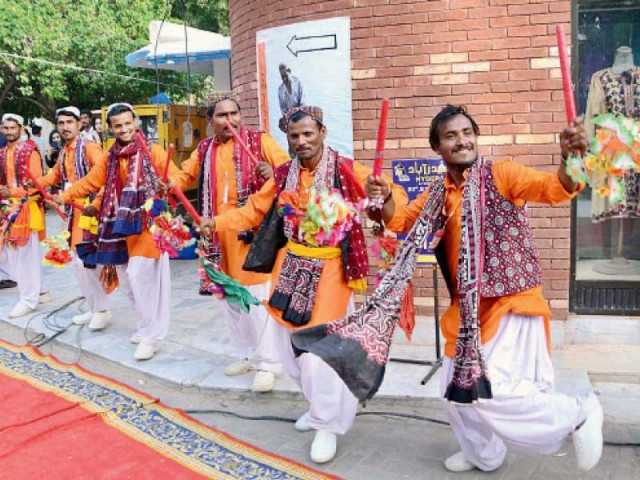Music, art, literature in spotlight
Festivity, vibrancy and ‘disregard for coronavirus SOPs’ mark event’s opening

The sixth edition of Hyderabad Literature Festival (HLF) started on Saturday amid the Covid-19 restrictions, yet thousands of people turned up to attend the event organised at the Sindh Museum’s lawns.
The event started with songs, tableaus and performers cracking jokes in folk style.
“These festivals are pivotal for promoting not just literature but also culture and language,” observed Sindh Culture Minister Syed Sardar Ali Shah.
He said despite some odds, his department had been continuously supporting literature festivals in the province.
Speaking at the inaugural session, Sindh culture secretary Ghulam Akbar Laghari criticised the audacity of people attending the event for their disregard for coronavirus-related standard operating procedures (SOPs).
“We are perhaps too brave or rather stupid,” he said.
Dr Suleman Shaikh, secretary of board of trustees of the Shaheed Zulfikar Ali Bhutto Institute of Science and Technology, spoke about resistance put up by Sindhi literati whenever the government attempted to “limit the use of Sindhi language.”
The elderly scholar reminisced that a ban on the use of Sindhi language was banned in 1963 sparked a resistance movement.
“Initially, we were just around 125 people, many of whom feared that their jobs or education would be in lost but still we went ahead with the protests,” he said.
The event’s organizer, Izhar Soomro, said 18 books will be launched during the two-day festival.
An exhibition of traditional artisans, embroidered clothes, paintings and photographs, besides book stalls, also was organised at the event.
Art and literature during the pandemic
Painter Shaista Momin said conspiracy theories and jokes pertaining to coronavirus emerged as two new forms of literature that entertained people locked in their homes during the past one year.
Momin said though art galleries remained closed, artists stood in good stead with each other during the pandemic, organising online painting exhibitions, which fetched earnings as well.
Urdu fiction writer Tanveer Anjum said surveillance of the society increased during the lockdown as people used online means to conduct their businesses.
“The surveillance system became complete because of the virus,” she said. “I think this is going to impact us in the future.”
A novel titled ‘Covid Novel’, written by Akhtar Hafeez, was launched during the session.
Gypsy tribes
Writer Khalid Jogi, whose book Khanabadosh Qabeela [Gypsy Tribes] was also launched, said these tribes were blessed with talent of art, music and dance.
“Yet they remain marginalised, ignored and, in fact, ostracized,” he lamented.
Jogi said the majority of gypsy tribes that hailed from the great Indian desert could be found in Umerkot, Tharparkar and Badin districts.
He lamented that for thousands of years these tribes had kept moving from one place to another, sometimes driven away by the rulers or influential people, but their miserable condition had remained the same even in the 21st century.
He said Sitara-e-Imtiaz recipient singer Reshma also belonged to a gypsy tribe, but her art was promoted and she became a world-renowned singer.
“Given a chance, these people can prove that they are not less capable than other people in the society,” he added.
Journalist Ishaq Mangrio objected to the use of offensive words to refer to these tribes and complained that even writers like Jogi had not tried to change such tribal names, which were considered slang words.
“These tribes faced the wrath of the past rulers. Even today, many of them don’t even have their NICs or permanent addresses,” the journalist said.
On the first day of HLF’s sixth edition, 11 session were organised and eight books were launched.
The day concluded with an interactive session with leading female poets including Azra Abbass, Tanveer Anjum, Farzana Shaheen, Mahjabeen Ghazal and Humera Shams.
A musical night was held later that spread the melodies of sufi songs in the air.
Published in The Express Tribune, March 21st, 2021.



















COMMENTS
Comments are moderated and generally will be posted if they are on-topic and not abusive.
For more information, please see our Comments FAQ